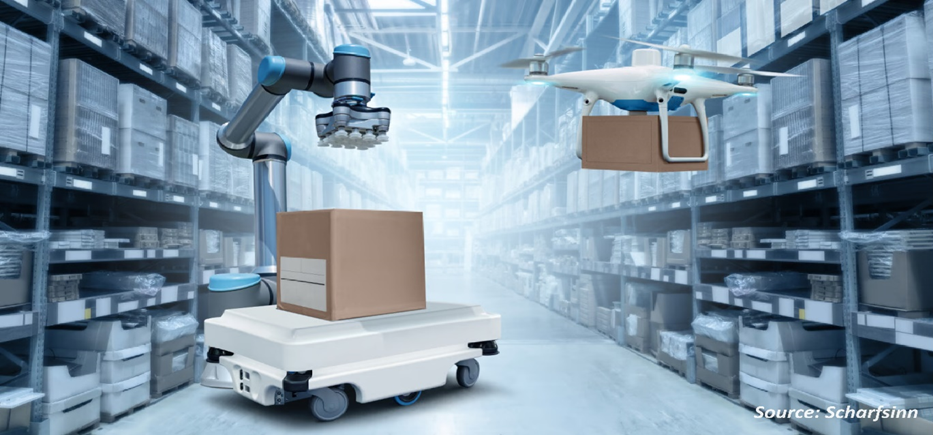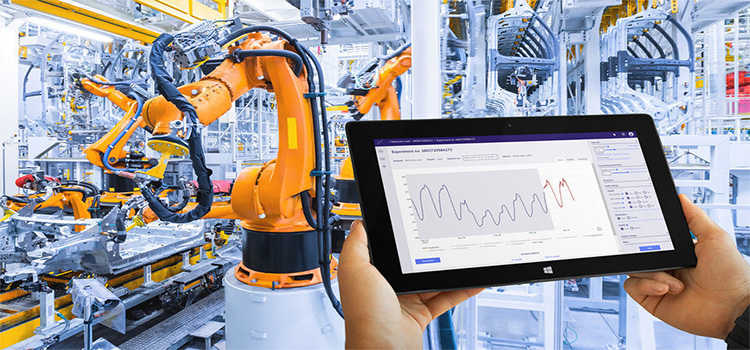
Personal Robot Market by Component (Hardware and Software) and by Application (Cleaning Robot, Entertainment & Toy Robot, Education Robot, Handicap Assistance Robot, Companion Robot, Personal Transportation Robot, and Security Robot) – Global Opportunity Analysis and Industry Forecast 2024-2030
Market Definition
The Personal Robot Market size was valued at USD 20.85 billion in 2023 and is predicted to reach USD 35.55 billion by 2030 with a CAGR of 6.8% from 2024-2030. A personal robot is a type of robot designed to assist individuals in their daily lives, serving various functions that can include tasks such as cleaning, cooking, security, and even companionship. These robots are a significant component of the personal robots market, a burgeoning sector of the robotics industry focused on creating innovative, AI-powered machines that cater to individual needs and improve the quality of life. As technology advances, personal robots are becoming more capable and affordable, and their market continues to expand, offering solutions that make our lives more convenient and efficient.
Market Dynamics and Trends
The increasing adoption of robots in household tasks such as cleaning, cooking, and security monitoring has led to rising demand for personal robots among consumers. Consumers are increasingly seeking convenience and efficiency in managing their homes, which has led to increased adoption of personal robots in domestic settings. These robots offer practical solutions to everyday chores, making life easier for homeowners and contributing to the rising trend of integrating robotics into homes for improved functionality and lifestyle enhancement.
Also, the rising elderly population contributes to the growth of the market as it provides companionship and help with daily tasks. These robots offer support and assist with healthcare-related activities such as reminding to take medication and monitoring health. This trend is improving the quality of life for the elderly and is significantly accelerating the personal robot market. According to the latest report published by the World Health Organization (WHO) in 2022, the number of people above 60 reached 1.4 billion in 2020, which is anticipated to reach 2.1 billion by 2050.
However, the deployment, programming, and integration of robotic services are expensive, which limits the ability of individuals with low income to adopt these technologies which in turn restrains the growth of the personal robot market. On the contrary, the personal robots market is expected to see ample growth opportunities in the coming years owing to advancements in machine vision cameras. Various businesses are now using 2D and 3D machine vision cameras with AI technologies to map and identify obstacles such as cables, dustbins, doorsills, rugs, and staircases, as well as the boundaries of the floor. Thus, the advancements in machine vision cameras enable personal household robots to navigate homes more effectively and efficiently, improving their functionality & usefulness.
Market Segmentations and Scope of the Study
The personal robot market share is segmented on the basis of component, application, and region. On the basis of component, the market is divided into hardware and software. On the basis of application, the market is classified into cleaning robot, entertainment & toy robot, education robot, handicap assistance robot, companion robot, personal transportation robot, and security robot. Geographic breakdown and analysis of each of the aforesaid segments includes regions comprising of North America, Europe, Asia-Pacific, and RoW.
Geographical Analysis
North America holds the dominant share of personal robot market at present and is expected to continue its dominance during the forecast period. This is attributed to the relatively high disposable income of consumers in this region. With a more substantial purchasing power, American households are more inclined to invest in premium home technologies and automation solutions, including personal robots.
According to the US Bureau of Labor Statistics (BLS), disposable income in the US witnessed a rise in spending patterns among American households in 2022. The average annual expenditures for all consumers amounted to USD 72,967, marking a substantial 9.0 % increase from the previous year. As disposable income levels continue to rise, the demand for smart homes products such as personal robots is expected to grow further, thus solidifying their position as integral components of modern American households.
Also, the presence of major key players such as iRobot Corporation, Hasbro Inc., Neato Robotics Inc., and Segway Inc. that are adopting product launches as their key developmental strategy which in turn boosts the market growth in this region. For instance, in March 2022, iRobot Corp. launched iRobot OS, a genius home intelligence platform. The iRobot OS allowed a new level of customer experience for a cleaner, healthier, and smarter home. iRobot OS understand the home environment, respect user preferences and intuitively integrate with the smart home ecosystem to get the job done.
On the other hand, Asia-Pacific is expected to show a steady rise in the personal robot market due to the pioneering efforts of tech giants such as LG, Samsung, and Xiaomi in countries including Japan, South Korea, China, and Singapore. These companies are actively investing in and advancing personal robot technologies thus resulting in increased adoption of personal robots in this region. For instance, in August 2022, Xiaomi, launched the company's first full-size humanoid robot named "CyberOne,". This innovation marks Xiaomi's entry into the personal robot market, offering a sophisticated and advanced robotic companion for consumers.
Moreover, the growing aging population in countries such as Japan and China is creating a demand for personal robots that can help older people live independently and manage their healthcare needs. The World Bank reports that in 2021, 30% of Japan's total population consists of individuals aged 65 and above. As people age, they may develop mobility or cognitive issues that make it difficult for them to perform everyday tasks or care for themselves. Personal assistive robots can help fill this gap by providing assistance with tasks such as bathing, dressing, and medication management, which is further expected to contribute to the growth of the market.
Competitive Landscape
Various market players operating in the personal robot market includes Honda Motor Company, Ltd., Ecovacs Robotics Inc., iRobot Corporation, Neato Robotics Inc., Samsung Electronics Co. Ltd., Hasbro Inc., ZMP Inc., Hansol Robotics Corp., F&P Robotics AG and Segway Inc. These market players are adopting product launches as their key developmental strategy to maintain their dominance in the personal robot market. For instance, in September 2022, iRobot Corp. launched the Roomba Combo j7+, the world's most advanced robot vacuum and mop. This innovative product combines vacuuming and mopping capabilities, offering users a comprehensive cleaning solution for their homes.
Also, in January 2022, ECOVACS launched DEEBOT X1 family of utra-premium cleaning robots. The robots is designed to provide advanced cleaning capabilities, enhancing the efficiency and convenience of household chores. This innovation is expected to drive the personal robot market by offering cutting-edge technology for home automation and making daily tasks easier for consumers.
KEY BENEFITS
-
The report provides quantitative analysis and estimations of the personal robot market from 2024 to 2030, which assists in identifying the prevailing market opportunities.
-
The study comprises a deep-dive analysis of the personal robot market including the current and future trends to depict prevalent investment pockets in the market.
-
Information related to key drivers, restraints, and opportunities and their impact on the personal robot market is provided in the report.
-
Competitive analysis of the players, along with their market share is provided in the report.
-
SWOT analysis and Porters Five Forces model is elaborated in the study.
-
Value chain analysis in the market study provides a clear picture of roles of stakeholders.
KEY MARKET SEGMENTS
By Component
-
Hardware
-
Software
By Application
-
Cleaning Robot
-
Entertainment & Toy Robot
-
Education Robot
-
Handicap Assistance Robot
-
Companion Robot
-
Personal Transportation Robot
-
Security Robot
By Region
-
North America
-
The U.S.
-
Canada
-
Mexico
-
-
Europe
-
The UK
-
Germany
-
France
-
Italy
-
Spain
-
Denmark
-
Netherlands
-
Finland
-
Sweden
-
Norway
-
Russia
-
Rest of Europe
-
-
Asia Pacific
-
China
-
Japan
-
India
-
South Korea
-
Australia
-
Indonesia
-
Singapore
-
Taiwan
-
Thailand
-
Rest of Asia Pacific
-
-
RoW
-
Latin America
-
Middle East
-
Africa
-
REPORT SCOPE AND SEGMENTATION:
|
Parameters |
Details |
|
Market Size in 2023 |
USD 20.85 Billion |
|
Revenue Forecast in 2030 |
USD 35.55 Billion |
|
Growth Rate |
CAGR of 6.8% from 2024 to 2030 |
|
Analysis Period |
2023–2030 |
|
Base Year Considered |
2023 |
|
Forecast Period |
2024–2030 |
|
Market Size Estimation |
Billion (USD) |
|
Growth Factors |
|
|
Countries Covered |
28 |
|
Companies Profiled |
10 |
|
Market Share |
Available for 10 companies |
|
Customization Scope |
Free customization (equivalent up to 80 working hours of analysts) after purchase. Addition or alteration to country, regional, and segment scope. |
|
Pricing and Purchase Options |
Avail customized purchase options to meet your exact research needs. |
KEY PLAYERS
-
Honda Motor Company, Ltd.
-
Ecovacs Robotics Inc.
-
iRobot Corporation
-
Neato Robotics Inc.
-
Samsung Electronics Co. Ltd.
-
Hasbro Inc.
-
ZMP Inc.
-
Hansol Robotics Corp.
-
F&P Robotics AG
-
Segway Inc.




 Speak to Our Analyst
Speak to Our Analyst


































